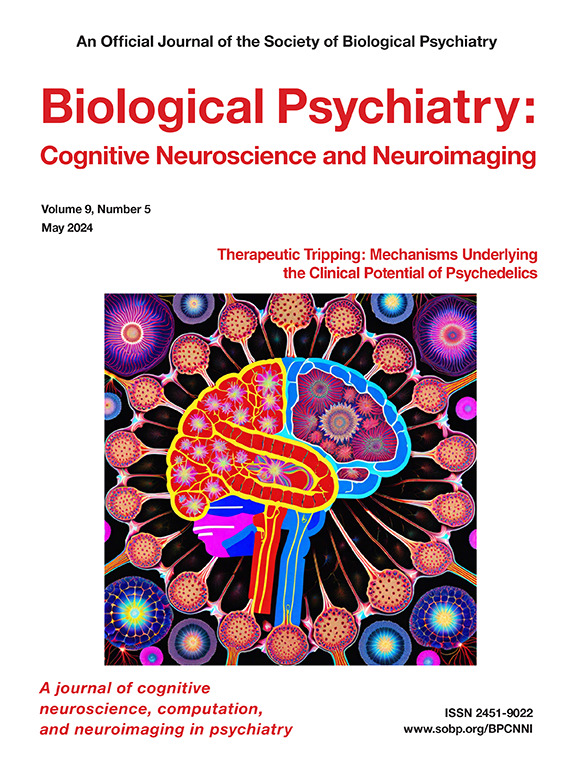失去控制前额叶情绪调节与症状严重程度有关,并可预测患有行为障碍的少女在接受治疗后的症状变化。
IF 4.8
2区 医学
Q1 NEUROSCIENCES
Biological Psychiatry-Cognitive Neuroscience and Neuroimaging
Pub Date : 2025-01-01
DOI:10.1016/j.bpsc.2024.08.005
引用次数: 0
摘要
背景:情绪调节能力与大脑皮质边缘活动(如背外侧前额叶皮质(dlPFC)和边缘区)有关,它能使人控制自己的情绪体验,从而实现健康的社会功能。据报道,神经精神疾病(包括行为障碍或对立违抗障碍(CD/ODD))都会导致情绪调节技能的紊乱。临床公认的改善 CD/ODD 情绪调节能力缺陷的方法包括认知或辩证行为技能疗法,如 START-NOW 计划中实施的方法。然而,情绪调节及其神经基质在青少年 CD/ODD 治疗后症状严重程度和预后中的作用仍有待研究:方法:采用分组比较和多元回归法分析了横断面数据,包括情绪调节过程中的fMRI反应(人数=114;平均年龄=15岁)、症状严重程度的重复测量评估(治疗前、治疗后、长期随访),以及在START-NOW随机对照试验(人数=44)之前和之后为患有CD/ODD的女性青少年收集的fMRI数据:结果:首先,患有 CD/ODD 的女性青少年情绪调节的行为和神经相关性受到干扰。其次,ODD症状的严重程度与调节过程中dlPFC/中央后回的活动呈负相关。第三,与治疗相关的症状变化可通过治疗前的 ODD 症状严重程度和调节性 dlPFC/中央后回活动进行预测。此外,对于那些接受了START NOW治疗的参与者来说,治疗前的dlPFC/中枢活动和ODD症状严重程度可以预测治疗后症状严重程度的长期缓解情况:我们的研究结果表明,情绪调节能力在CD/ODD的特征中扮演着重要角色,并表明调节性dlPFC/中枢活动与患有CD/ODD的女性青少年的治疗反应呈正相关。本文章由计算机程序翻译,如有差异,请以英文原文为准。
Losing Control: Prefrontal Emotion Regulation Is Related to Symptom Severity and Predicts Treatment-Related Symptom Change in Adolescent Girls With Conduct Disorder
Background
Emotion regulation skills are linked to corticolimbic brain activity (e.g., dorsolateral prefrontal cortex [dlPFC] and limbic regions) and enable an individual to control their emotional experiences, thus allowing healthy social functioning. Disruptions in emotion regulation skills are reported in neuropsychiatric disorders, including conduct disorder or oppositional defiant disorder (CD/ODD). Clinically recognized means to ameliorate emotion regulation deficits observed in CD/ODD include cognitive or dialectical behavioral skills therapy as implemented in the START NOW program. However, the role of emotion regulation and its neural substrates in symptom severity and prognosis following treatment of adolescent CD/ODD has not been investigated.
Methods
Cross-sectional data including functional magnetic resonance imaging responses during emotion regulation (N = 114; average age = 15 years), repeated-measures assessments of symptom severity (pretreatment, posttreatment, long-term follow-up), and functional magnetic resonance imaging data collected prior to and following the START NOW randomized controlled trial (n = 44) for female adolescents with CD/ODD were analyzed using group comparisons and multiple regression.
Results
First, behavioral and neural correlates of emotion regulation were disrupted in female adolescents with CD/ODD. Second, ODD symptom severity was negatively associated with dlPFC/precentral gyrus activity during regulation. Third, treatment-related symptom changes were predicted by pretreatment ODD symptom severity and regulatory dlPFC/precentral activity. Additionally, pretreatment dlPFC/precentral activity and ODD symptom severity predicted long-term reductions in symptom severity following treatment for participants who received the START NOW treatment.
Conclusions
Our findings demonstrate the important role that emotion regulation skills play in the characteristics of CD/ODD and show that regulatory dlPFC/precentral activity is positively associated with treatment response in female adolescents with CD/ODD.
求助全文
通过发布文献求助,成功后即可免费获取论文全文。
去求助
来源期刊

Biological Psychiatry-Cognitive Neuroscience and Neuroimaging
Neuroscience-Biological Psychiatry
CiteScore
10.40
自引率
1.70%
发文量
247
审稿时长
30 days
期刊介绍:
Biological Psychiatry: Cognitive Neuroscience and Neuroimaging is an official journal of the Society for Biological Psychiatry, whose purpose is to promote excellence in scientific research and education in fields that investigate the nature, causes, mechanisms, and treatments of disorders of thought, emotion, or behavior. In accord with this mission, this peer-reviewed, rapid-publication, international journal focuses on studies using the tools and constructs of cognitive neuroscience, including the full range of non-invasive neuroimaging and human extra- and intracranial physiological recording methodologies. It publishes both basic and clinical studies, including those that incorporate genetic data, pharmacological challenges, and computational modeling approaches. The journal publishes novel results of original research which represent an important new lead or significant impact on the field. Reviews and commentaries that focus on topics of current research and interest are also encouraged.
 求助内容:
求助内容: 应助结果提醒方式:
应助结果提醒方式:


